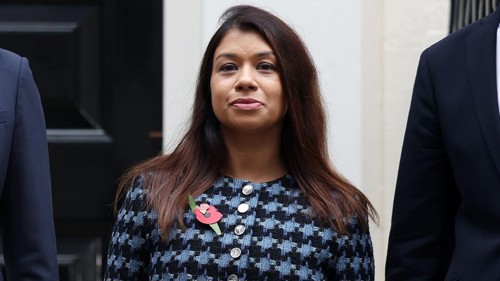
UK Minister named in £3.9bn Bangladesh corruption probe
20/12/2024
A labour minister has been named in an investigation into claims her family embezzled up to £3.9bn (Tk 590 billion) from infrastructure projects in Bangladesh.
Tulip Siddiq, 42, who as the Treasury's Economic Secretary is responsible for tackling corruption in UK financial markets, is alleged to have brokered a deal with Russia in 2013 that overinflated the price of a new nuclear power plant in Bangladesh.

The allegation is part of a wider investigation by Bangladesh's Anti-Corruption Commission (ACC) into Siddiq's aunt, Sheikh Hasina, who was deposed as prime minister of the country in August.
A source close to Siddiq said these were "trumped up charges".
The source also said the allegations were "completely politically motivated" and designed to damage her aunt.
Conservative shadow home office minister Matt Vickers said: "The fact Labour's anti-corruption minister is reportedly embroiled in a corruption case is the latest stain on Keir Starmer's judgement.
"It is high time she came clean. The British public deserve a government that is focused on their priorities, not distracted by yet another scandal."
Downing Street said Prime Minister Sir Keir Starmer had confidence in Siddiq, and she will continue her responsibility as the minister overseeing anti-corruption efforts.
Siddiq has "denied any involvement in the claims" accusing her of involvement in embezzlement, according to the prime minister's official spokesman.
But she has recused herself - or stepped back - from any political decisions involving Bangladesh, the spokesman added.
The investigation is based on a series of allegations made by Bobby Hajjaj, a senior political opponent of Hasina.
The BBC understands that Siddiq has not had any contact with the ACC as part of the investigation.
The ACC is also investigating several of Hasina's family members, including Siddiq's mother Sheikh Rehana Siddiq, and senior officials from her government.
Hasina, who was in charge of Bangladesh for more than 20 years, was seen as an autocrat whose government ruthlessly clamped down on dissent.
Since fleeing the country Hasina has been accused of multiple crimes by the new Bangladeshi government.
Hasina is wanted by Bangladesh's International Criminal Tribunal (ICT) for her alleged involvements in "crimes against humanity" that took place during the demonstrations, in which hundreds were killed.
Arrest warrants have also been issued for 45 others, including former government ministers who also fled the country.
Syed Faruk, who runs the UK branch of Hasina's Awami League party, said the claims were "fabricated".
Siddiq was elected MP for Hampstead and Highgate in 2015, the north London constituency neighbouring Prime Minister Sir Keir Starmer's seat of Holborn and St Pancras.
Corruption allegations and convictions against top leaders of ousted governments are not new in Bangladesh.
Hasina's main predecessor as prime minister, Khaleda Zia faced similar charges, which she also dismissed as politically motivated. As did ex-president Hussain Muhammad Ershad, who seized power as head of the army during a bloodless coup in 1982.
The Bangladeshi judiciary's independence has long been questioned.
Government changes often bring judicial reshuffles, with ruling parties regularly accused of targeting political opponents.
Court documents seen by the BBC show Hajjaj has accused Siddiq of mediating and coordinating meetings for the Bangladeshi officials with the Russian government to build the £10bn Rooppur Power Plant Project.
It is claimed that the deal inflated the price of the plant by £1bn, according to the documents - 30% of which was allegedly distributed to Siddiq and other family members via a complex network of banks and overseas companies.
In total, Hajjaj alleges £3.9bn was siphoned out of the project by Hasina's family and minister.
Footage from 2013 appears to show Siddiq attended the deal's signing by Hasina and Russian President Vladimir Putin at the Kremlin, recorded by the Associated Press.
Source
The Team
Meet the team of industry experts behind Comsure
Find out moreLatest News
Keep up to date with the very latest news from Comsure
Find out moreGallery
View our latest imagery from our news and work
Find out moreContact
Think we can help you and your business? Chat to us today
Get In TouchNews Disclaimer
As well as owning and publishing Comsure's copyrighted works, Comsure wishes to use the copyright-protected works of others. To do so, Comsure is applying for exemptions in the UK copyright law. There are certain very specific situations where Comsure is permitted to do so without seeking permission from the owner. These exemptions are in the copyright sections of the Copyright, Designs and Patents Act 1988 (as amended)[www.gov.UK/government/publications/copyright-acts-and-related-laws]. Many situations allow for Comsure to apply for exemptions. These include 1] Non-commercial research and private study, 2] Criticism, review and reporting of current events, 3] the copying of works in any medium as long as the use is to illustrate a point. 4] no posting is for commercial purposes [payment]. (for a full list of exemptions, please read here www.gov.uk/guidance/exceptions-to-copyright]. Concerning the exceptions, Comsure will acknowledge the work of the source author by providing a link to the source material. Comsure claims no ownership of non-Comsure content. The non-Comsure articles posted on the Comsure website are deemed important, relevant, and newsworthy to a Comsure audience (e.g. regulated financial services and professional firms [DNFSBs]). Comsure does not wish to take any credit for the publication, and the publication can be read in full in its original form if you click the articles link that always accompanies the news item. Also, Comsure does not seek any payment for highlighting these important articles. If you want any article removed, Comsure will automatically do so on a reasonable request if you email info@comsuregroup.com.


